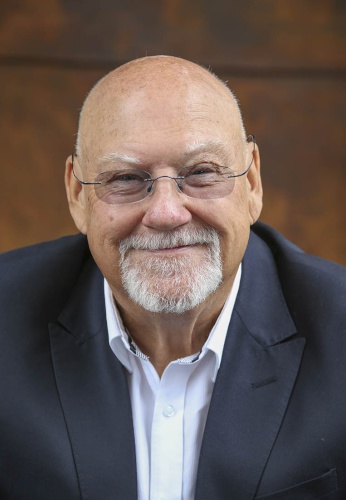Sir Ray Avery at SEWF 2017: get ready to "dream big"

by Lee Mannion, Pioneers Post.
Sometimes good things can come out of terrible situations. Ahead of his appearance at the Social Enterprise World Forum in September, serial social entrepreneur Sir Ray Avery explains his motivation to make millions of people's lives better.
The story of Sir Ray Avery is extraordinary. He
survived a childhood of brutalisation that involved physical
and sexual abuse, that in turn led to homelessness. He went
on to become a social entrepreneur whose inventions have
changed the lives of millions of people.
What follows is
a potted history that will briefly try to join the dots, but
for the full story his autobiography is recommended.
After educating himself in libraries and becoming a forensic scientist, he went off to find himself, travelling through Afghanistan, Pakistan and India. He says: “For the first time I’d seen real poverty. I didn't know what to do about it but it certainly had a profound effect on what I would do later in life.”
Some years later he became the technical director of a pharmaceutical company in New Zealand and went on from there to work for the Fred Hollows Foundation.
He had an idea for a machine that could make intraocular lenses, which are implanted in the eye to counteract cataracts or myopia; they’d been handmade up to that point.
The machine sped up the production of lenses and collapsed the prohibitive price. The result is that there are now somewhere between 16m and 20m people that have benefitted from his invention.
“The average life expectancy has 30,000 days, so plan what you are going to do with it...you’ll be much more successful”
And he didn’t stop there. Avery founded Medicine Mondiale and went on to invent more effective incubators to combat child mortality and amino acids that can be more easily absorbed by those suffering from malnutrition. The estimate is that these will have helped half a billion kids in Africa by 2030.
When asked how he feels about the impact that he has made he simply says: “What it did teach me was that one person can change the world.”
It was his early terrible experiences that provided the motivation. “Part of it is embedded in my history," he says. "When you’ve had the brutalisation that I’ve had as a kid the only way to make sense of it is to do something absolutely outstanding, because then it makes sense.
“I haven’t quite got there yet, I still keep striving to ameliorate the bad things that happened to me by doing something, to say that that was the price that I paid for being extraordinary."
What are you going
to be speaking about at SEWF?
Making the world a
better place in terms of using innovation. I'll also be
launching a Sir Ray Avery innovation award – we want
people to start thinking about designing things that are
good for our planet.
Why have you chosen to
pursue your goals via social enterprise?
For me
it’s just a fundamental part of who we are, to do things
that are good for us, for our species. It’s what we all
should be doing.
Early on in the evolution of mankind
everything was a social enterprise. The earliest villages in
the UK were formed because people worked together to scale
together. Councils were formed and the local community
benefitted.
Scale has distorted things. Governments now
make decisions on behalf of the stakeholders and they’re
not often in the best interests of the people or the country
or the environment or whatever.
So, social enterprise is
about working for us as a species – it’s the most
natural thing in the world if you think about it. But we
don’t do it generally because people that hold the money
want the money to go to the shareholders rather than the
community.
What’s your advice for young people
who want to become social entrepreneurs?
Have a
plan. If you’re smart, when you’re starting a business,
have an exit strategy. The exit plan will help design the
strategy for that business.
We’re the only species
that knows we are going to die but do nothing about it. The
average life expectancy has 30,000 days, so plan what you
are going to do with it. If you do that you’ll be much
more successful. If you’ve got a plan you’ve always got
to make sure that things fit in line with what you are
trying to achieve.
Most importantly, measure yourself
against your objective and your dreams.
What are
you hoping to gain from attending the SEWF?
I'm
hoping to inspire others to dream really big. One of the
things people say is that you can’t take it with you when
you go. When they’re about to put me in the ground I hope
that I’ll slide the top to one side and say: “I’ve
just got another idea.”
You don't die if you have
lived on in somebody's mind. So what I'm hoping to do is
inspire young people to get things going.
Often people
will meet me and tell me that I motivated them to get off
their butt and you do the work for those reasons. You don't
do it for the the people who might meet you and thank you
for restoring their child’s sight. You do it for the
promise of them doing something extraordinary.
The people
that are crazy enough to believe they can change the world
are the ones that do.
Pioneers Post is media partner to the Social Enterprise World Forum 2017, which will be held in New Zealand on 27-29 September. For more details, see www.sewf2017.org.
This article was originally written by Pioneers Post in the lead up to the Social Enterprise World Forum. To read the original article, please visit: Pioneers Post.
ENDS



 Eugene Doyle: The Fall Of Saigon 1975 - Fifty Years Of Repeating What Was Forgotten
Eugene Doyle: The Fall Of Saigon 1975 - Fifty Years Of Repeating What Was Forgotten Peter Dunne: Dunne's Weekly - Trump's Tariffs Still Pose Risks For New Zealand
Peter Dunne: Dunne's Weekly - Trump's Tariffs Still Pose Risks For New Zealand Keith Rankin: Barbecued Hamburgers And Churchill's Bestie
Keith Rankin: Barbecued Hamburgers And Churchill's Bestie Gordon Campbell: On Why The US Stands To Lose The Tariff Wars
Gordon Campbell: On Why The US Stands To Lose The Tariff Wars Eugene Doyle: Before It’s Too Late - Reimagine New Zealand’s Military Future
Eugene Doyle: Before It’s Too Late - Reimagine New Zealand’s Military Future  Binoy Kampmark: Gender Stunts In Space - Blue Origin’s Female Celebrity Envoys
Binoy Kampmark: Gender Stunts In Space - Blue Origin’s Female Celebrity Envoys